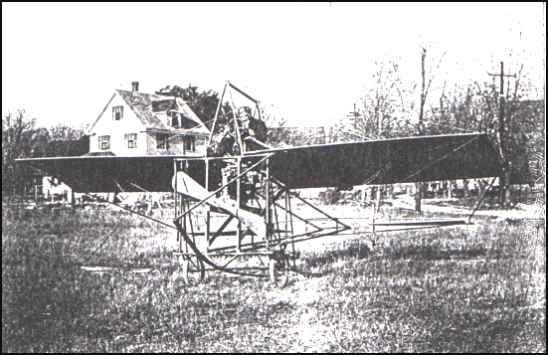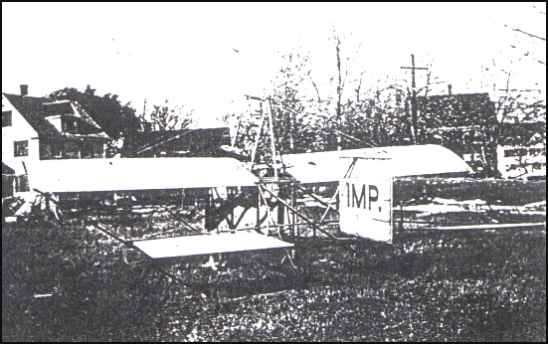
 |
 |
|
12-19-02 I noticed on your Early Birds web site you credit Henry Walden as being the first person to have a U.S.-built monoplane manned flight which occurred on December 9, 1909. Was Henry Walden the first American to fly a monoplane or was it Elmer Allah Burlingame ? Although I do not know very much about it, I am sending seven pictures of Elmer's plane and flight. They were sent to me by one of Elmer's descendants. Although I was thankful to receive the pictures, as you can see the pictures are not very clear but I think that is because they are xerox copies or maybe even xerox copies of xerox copies. These pictures were apparently taken in the year of 1909, so it looks like there might be a possibility that Elmer Burlingame may have been the first American to fly a monoplane. |
 |
 |
| Ralph, It is so neat to be able to sit down at my personal computer keyboard and send you an e-mail message and later receive an
answer. But have you ever wondered who was the very first person to be able to this. I believe it was Elmer Allah Burlingame.
Of course he was not able to do this by using a computer, the internet, or e-mail, but he was able to do this with his invention, which
was later called The Burlingame Telegraphing Typewriter. An ordinary typewriter would be hooked up to Elmer's invention at one end of
a telephone wire and another ordinary typewriter would be hooked up to Elmer's invention at the other end of the telephone wire. Then
all you had to do was type a message from one typewriter keyboard, much like we do today, and it would be received by the typewriter
at the other end of the line, much like it is today. With a few adjustments this machine could also send messages wireless. After about
70 years of using the telegraph, with a single key sending dots and dashes, Elmer made it possible to send letters and word messages
by using a typewriter keyboard, much like we do today. In an article I have about Elmer it says, "When only a boy of fourteen years of age he had successfully installed according to contract, a burglar alarm system in a large flour mill in his home town". I am sure it was talking about LaPorte, Indiana. It also said he came up with the idea, for what later became the Burlingame Telegraphing Typewriter, while attending high school in 1898 The following is something I recently found at the Indiana State Library: From the History of LaPorte Co., Indiana, by Rev. E. D. Daniels, 1904. The LaPorte Argus-Bulletin of December 2, 1903, contained the following: "By the genius of Elmer Burlingame, a LaPorte boy, the sermon preached Sunday by the Rev. Dr. D. H. Cooper, pastor of the First Baptist Church, at Peru, was heard in Logansport, Wabash and by dozens of people in Peru. Previous to the meeting no announcement of the innovation was made. A transmitter was placed in front of the pulpit and connected with the Home Telephone Company's exchange, where Burlingame was waiting to ascertain the success of the experiment. When it was learned that the arrangement was working satisfactorily, friends in Peru and other cities were called up." It is said that the clergy are alarmed at this but they need not be. They fear that such inventions will increase the habit of non-church-going which is already so prevalent. But there is a power of sacrament and an atmosphere of worship which cannot be transmitted over telephone wires, and which can be received only by one's personal presence in the congregation, and this will come to be understood. Although I have little bit of information about Elmer, I still have a lot of unanswered questions, especially concerning his invention, and his company. It seems that Elmer's invention was highly praised at first, but his success was short lived. I don't know whether he went bankrupt, or if he was bought out by another company, or what. What ever happened I can tell you this, it would not diminish my opinion about the significance of his inventions, nor that I also believe he did not receive the credit he deserved, or the credit he now deserves. I will be looking forward to your reply. Philip L. Fletcher |


|